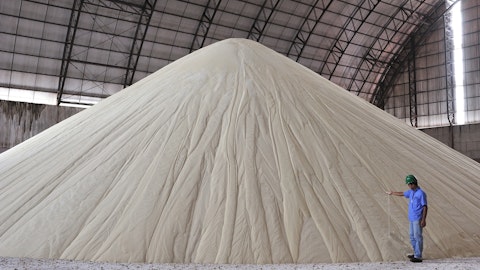Rich Sumner: Yes, Hassan. Thanks for the question. I think, hopefully, I’ll answer your question the right way here for you to make sense of it. I think, if you were to look at discount levels across the regions rather than our global discount, because you can’t really apply the average discount to all the prices. It’s really that each region does have its own kind of market discount levels, which do vary quite widely depending on which region you’re looking at. So, our ARPs, if you were to look at our ARPs by region, that would probably make more sense and probably more reflective of kind of reasonable pricing differentials between those. So, it’s hard to look at the global discount and apply that, and try to make sense of those prices relative to say, spots or other markers.
Hassan Ahmed: Understood. And just coming back to sort of broader question. I know it’s all recent occurrences and the like in the Middle East. But I mean, are you guys seeing any meaningful shifts as a result of that in trade flows? I mean, I guess more specifically, what are you guys hearing in terms of Iranian product?
Rich Sumner: Yes. So, as of right now, we’re not hearing any disruptions as of today. We are monitoring the situation very closely, and really hoping for a peaceful and sustainable resolution here for everyone, but we haven’t seen any disruption. Israel doesn’t have any meaningful really methanol demand, nor is there any supply. And in the area, there, there’s no methanol trade routes that are impacted. Now, if this were to escalate in the region, a lot of things could be impacted, including methanol. So — but we haven’t seen any of those disruptions yet, but that could impact crude, it could impact L&G trade flows, methanol trade flows. And so those could have really meaningful impacts on the industry and — but we haven’t seen any of that yet. But we’re closely monitoring to see obviously what’s going to — how this is going to unfold.
Hassan Ahmed: Very helpful, Rich. Thanks so much.
Operator: Our next question comes from Matthew Blair from Tudor, Pickering, Holt. Please go ahead, your line is open.
Matthew Blair: Hey. Good afternoon or good morning, sorry. Could you talk about any opportunities you’re looking at for your underutilized assets? Is there a chance that you could take apart Atlas, move it to the U.S., like you did with some of your Chile plants a long time ago? Or is there an opportunity for converting those assets into an E-methanol plant?
Rich Sumner: Yes. So, we — in terms of relocation in Trinidad, at this point, we remain committed to Trinidad. And we are — we think there’s a lot of incentives today to get assets, underutilized assets operating in place, where they are today, and that assets operated really well for us in Trinidad. So, we are focused there. Now, we do have experience relocating plants. We moved Chile 2 and 3 to Geismar. Our experience on plant relocation is that the capital cost savings are really not that meaningful. It’s really about speed. The construction timeframe can probably be — we could probably save a year on in terms of the construction timeframes versus building news. So, it has advantages there. We’re not considering that today for Atlas, as we want to work on getting longer-term sustainable gas in Trinidad.
But that is something that we’ve done before, we have a lot of experience with, and there is that speed advantage in the event that you wanted to move quickly on a project.
Matthew Blair: Sounds good. And then could you talk a little bit about the moving parts on cash flows in 2024. Should we think of your CapEx moving down to the, I don’t know, $150 million to $200 million range? I think you mentioned the debt pay down of about $300 million next year. There’s also the dividend of $50 million plus potentially a working capital build as you ramp up G3. Would the remainder, any remaining cash flow go to buybacks in that scenario?



